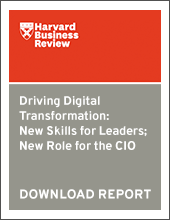As we move to an information-based economy, digital transformation is essential for almost every enterprise. Not all enterprises know this yet. Worse, some know it, but they are apparently hoping that if they ignore it, it will go away. But organizations can't bury their heads in the sand and survive – today an organization can become irrelevant well before its people are ready to change.
It isn’t that the signs haven't been visible. Competition and demand from stakeholders have increasingly mandated that enterprises adopt a digital strategy. Our recent research with Harvard Business Review further drives the point home – it's time to start paying attention. Leaders in all types of enterprises, not just commercial but government, education, NGOs, and others must realize the digital challenge and respond.
IT is well positioned to coach
IT leaders can have a substantial impact on moving their organizations to the digital future. They typically see the entire business, are familiar with the business processes, and they may be better attuned to the challenges, opportunities, and threats associated with forthcoming technology trends. With this comprehensive view of digital opportunities, IT leaders are well positioned to coach and consult with their business partners regarding how new technology will impact the organization.

This coaching will be necessary because digital skills are no longer exclusive to IT alone. They are an increasing requirement for success across the enterprise. All individuals and enterprises should be investing in improving their digital competencies. For some individuals – the digital natives – this may not seem like a big deal. For others, it will remain totally foreign.
But we are in a transitional period. Many of today’s children become digital natives soon after birth, and professionals entering the workforce don't realize what the world of business was like before digital technology. By coaching digital skills in an enterprise, IT can help foster understanding across the organization and ensure everyone in the business has the digital knowledge they need to succeed.
IT can’t do it alone
Solving the problems and addressing the opportunities of digital transformation is a big job, and IT can't do it alone. Leadership engagement is required across the enterprise. And it’s likely that cultural changes are also required in many enterprises. Cultural changes take time, and many people are resistant to change, so time is of the essence for an organization to develop a digital leadership capability. Given the external pace of change, organizations need to be aggressive in promoting digital leadership.
Many digital transformation leadership best practices – open organizations, collaboration, decentralized decision making, responsive and collaborative cultures – may not align with traditional management hierarchies and legacy thinking about management control. But things are changing, and we’re seeing more and more proof that these new management styles are enabling businesses to succeed in ways not possible in the past. Our CEO Jim Whitehurst references several examples of these highly-collaborative work cultures in his book, “The Open Organization.” The fact is, the way your organization is currently designed may need to change in response to the emerging digital world. And your business processes may need to be restructured or replaced, as well.
For many organizations, it won't be easy. But I think we'll see this concept of what I call “business-driven IT” – the partnerships between business teams and IT professionals – clearly emerge as a best practice for moving ahead in the digital world. IT should absolutely lead or be a leader in this transformation. When have our jobs been more relevant?
ALSO READ
Lee Congdon is responsible for Red Hat’s global information systems, including the technology strategy, enterprise architecture, information technology governance, solutions delivery, and systems operations supporting the company. His role includes enabling Red Hat’s business through services, such as knowledge management, technology innovation, technology-enabled collaboration, and process improvement.




